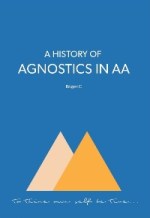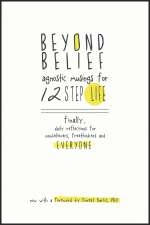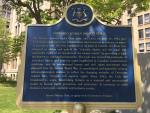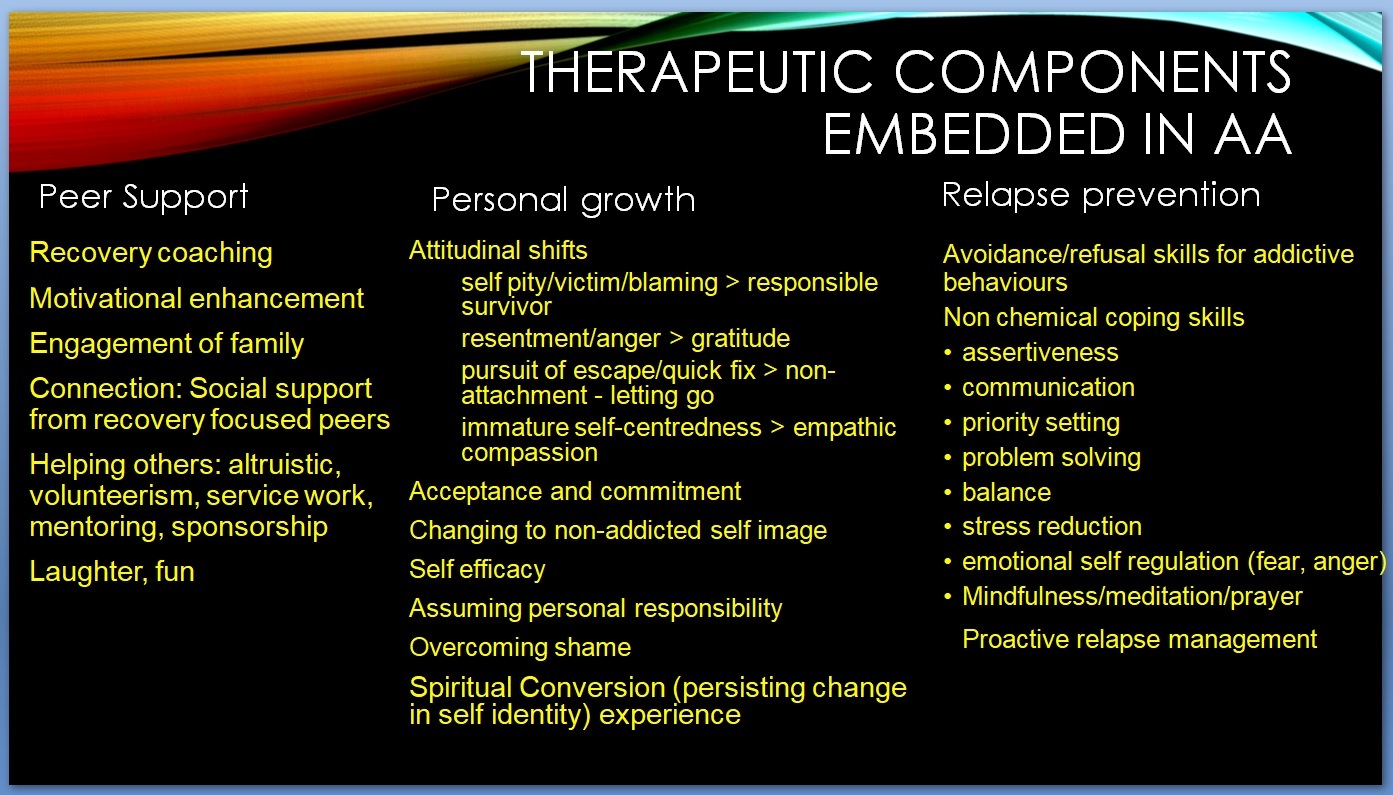Fifty Chosen Articles:
Number Thirty-Three.
Originally posted in December 2016.
“Special interest groups were controversial for many years in AA.”
By Deirdre S.
I’m Deirdre S., a cross-addicted alcoholic.
To prepare to talk to you I began by speaking to members in New York who knew the founders of the no-prayer meetings there. The topic that kept coming up was about special interest groups in AA. That information, different from what I was deliberately asking about, took a while to sink in.
When it comes to the question of what struggle we as atheists, agnostics and freethinkers in Alcoholics Anonymous are in, it’s crystal clear. Just as all members of AA, we struggle to stay sober. We struggle to make certain that the hand of AA will always be there for the sick and suffering who are still hurting themselves with alcohol.
There is no doubt that we represent a movement with the goal of further recognition and acceptance within AA for people who are agnostics, atheists, freethinkers, and others. In a way, we are just like women, African-Americans, Lesbian, Gay, Bisexual and Trans-gendered people, young people, seniors, professionals, special needs people, Native Americans, and others. We are a special interest group within AA.
Special interest groups have an interesting history in AA. They have been called “special purpose” groups and “special composition” groups. There were arguments about whether they should be called “groups” or simply “meetings.” There were also discussions about having a club verses having a clubhouse. I’m not saying I understand all the nuances. The language used is parsed to the nth degree.
Special interest groups were themselves controversial for many years in AA. There was a huge discussion about them in mid 1970s that led to Dr. Jack Norris, then Chairman of the General Service Board, in 1977 to say in part:
We have never discouraged AA’s from forming special-purpose meetings of any or all kinds to meet the needs of interested individuals, but we have been hesitant to consider as groups those that might seem to exclude any alcoholic, for whatever reason.
Many members feel that no AA group is special and, therefore, that no group should be labeled as such or even give the impression that it is “special.” However, the fact is that such groups do exist…These groups feel that “labels” serve the purpose of attraction (providing double identification) and are not intended to imply exclusion of other alcoholics. (Special Composition Groups in AA)
In the October 1977 issue of the Grapevine K.S. wrote:
Members of special groups are certain that many of their kind would never be able to get themselves to AA if they had to enter through a regular group. Whether or not we agree with this thinking, the point is that many alcoholics do believe in it. And they believe in it seriously enough to form these special groups and make them work. (Special Composition Groups in AA)
I was talking to Bob F. of New York City about his memories and experiences as an African-American atheist in AA. He told me that recently a letter was found at the Intergroup offices in New York City. It was from 1957 written by a member from the Riverton Group in Harlem asking if Black members could participate in the Intergroup delegates meeting. Isn’t that something? Now the first meeting in Harlem was started in 1945. So this letter is 12 years later. Twelve years is a long time. And I do not know how the Harlem member was answered.
My friend Bob F. said that up into the 1970s de-facto segregation existed. As a Black member of AA you could go to any meeting, but you had to sit in the back and couldn’t share unless it was a meeting that catered to Black members.
Barry Leach a old-timer and gay member of early AA, the man who wrote Living Sober and “Do you think you’re different?”, talked about the struggle for LGBTQ meetings to be recognized, listed, and eventually embraced by AA. (Directory Listing of the Gay and Lesbian Groups) In 1937, just a few years after the creation of AA meetings, a man came in who was, excuse the language here, a “sexual deviant.” A rancorous discussion only ended when Dr. Bob spoke in favor of letting the man in. Bill W. called Dr. Bob’s intervention the beginning of the 12 Traditions.
Bill W. said in 1968, the last time he had a chance to speak at a General Service Conference, that the only pertinent question about an individual is whether the person is a drunk. If the answer is yes, then the person can be a member. Bill went on to say:
That is the beginning of the AA tradition that any man who has a drinking problem is a member of AA if he says so not whether we say so. Now I think that the import on this on the common welfare has already been sustained because it takes in even more territory than the confines of our fellowship. It takes in the whole world of Alcoholics Anonymous. Their charter to freedom to join AA is assured. Indeed it was an act in general welfare. (Gay Origins of the Third Tradition)
By 1945 there was enough alcoholics who were Gay or Lesbian to warrant the question of whether they should have their own meetings. Bill W. put the decision about that off. But you know that a good idea has legs and gets going anyway. The first exclusively “Gay” meeting was held at an Episcopal Church in San Francisco in 1967. (History of Gay AA)
Pressure was building on the General Service office about listing gay meetings in the World Directory. The question went before the Conference of Delegates in 1973. There was such a hot and heavy discussion that the question was tabled for a year. It came around again in 1974. There the discussion was very rancorous. The most hateful terms about Gay men and Lesbians were thrown about. All other matters that had been on the agenda were tabled while the speeches went on.
It finally all ended when one of the non-alcoholic doctors on the Board of Trustees went to the microphone and asked, “I understand that when you wanted – when your people’s groups wanted to be listed you didn’t go through all of these shenanigans, Is that true? and there was a chorus of ‘Yes.’ When the women’s groups wanted to be listed you didn’t go through this?” Again the answer was that they had not. (More on that in a moment.) Then the doctor asked, “Well, what the hell are you picking on these guys for?” That was the end of it and they put the question to a vote and it passed with only two people opposing the inclusion. So in 1945 the question comes up and it is settled in 1974, 29 years later.
As for the assertion that it was easy for woman to form meetings of their own it was not quite so. In Cleveland in 1941 women formed the very first special group to ask for and get recognition in AA. There had been resistance to women attending the AA meetings. A woman’s presence was considered a disturbing factor. There was worry about hanky-panky. Once it was accepted that woman needed and could get sober in AA, their growth was explosive. They busted the myth that AA just wouldn’t work for women, prevalent at the time. (Special Composition Groups in AA)
In 2011 I had a conversation with David L. one of the three founders of the first New York meeting called “We Atheists.” The meeting came about after an advertisement was placed in the 1986 issue of Free Inquiry. The ad was focused on people who were in AA, but were having trouble with the God-stuff in AA meetings. Harry from California, the man who placed the ad, got back three letters and helped put David L., Ada Halbreich, and John Yablon together. They began meeting at Ada’s apartment. The first meeting was held September 10, 1986. That means that for 30 years now there have been agnostic/no-prayer AA meetings in New York.
According to David L., in the 1980s there was an increase in religious fundamentalism nation-wide. That movement was reflected in AA. As a result, there developed a controversy over special interest groups in AA in San Antonio, TX. It came to a head at a local steering committee meeting where a group of transgendered people had asked for their meeting to be listed. When the discussion was scheduled to come up, the steering committee swelled from the normal 30 people to 300 people. Some men there raised hell not only about the inclusion of the transgendered meeting, but also about women’s meetings and gay meetings, saying that there should be no special interest groups of any kind. Three hours of acrimonious discussion followed. Apparently the transgender meeting withdrew its request, which is a shame.
David told me that in the 1980s some Intergroups refused to list the agnostic meetings.
As for agnosticism, he felt that more people in AA needed to come out and speak up about their lack of belief. One of the things that the three New York City founders believed in passionately was that the agnostic/no-prayer meetings stay in AA and not attempt to form a group outside of the organization.
Based on this quick history of special interest groups and meetings I’d say that the problems that some no-prayer meetings have been having getting listed are in line with AA history. As an organization it moves slowly.
But, the way that one fights an enemy is different than how one struggles with an opponent. And again it’s different than how sisters and brothers resolve their differences, if they can.
And I don’t mean to imply that the clashes over the listing, as well as the use of different versions of the steps, have not been painful. Relationships are broken. Business meetings get hot. Rash decisions are made. I know that when we had some negative interactions in New York GSO about our website that they were very painful to me personally.
So let’s do a check on the material reality that is driving this question. Since their foundation in Chicago in 1975, there has been much growth in no-prayer meetings.
I’m mostly known as the woman who updates the AgnosticAANYC.org website, so let me start there.
September 11th, 2001 fell on a Tuesday, the night of my home meeting. During that horrible day, we called each other to see if everyone was okay. Luckily, we had not lost anyone from the agnostic AA meetings. However, everything below 14th Street was in lock-down. Our meeting was at the LGBTQ Center on 13th Street and it was closed due to the crisis. We had to decide what to do and made a series of calls and sent a bunch of emails. It was not easy to reach people because of problems with the phone service. Also a number of cell phones became unusable due to attack. The point is that people in our group were hard to reach.
Once it was clear that our meeting place would be closed and that people couldn’t get below 14th Street, we decided to come together in a diner just above 14th where we usually went to socialize after our meeting. It may seem weird to get together for dinner and an informal meeting on a day like that, but it was a comfort to see the faces of beloved meeting members.
It was just after that that Charles P. floated the idea of having a website where NYC members could check and see if a meeting was happening or not. The website came to be in mid-2002. He also created some email lists at the same time. He carefully wrote a questionnaire about what people wanted and needed in a website and created it. The website started with a list of NYC meetings, Frequently Asked Questions, a national list of meetings put together by Leonard V. and others, and some meeting scripts and other documents.
Once the national list was assembled, the question of how many meetings there are kept coming up. I took over the website in 2006.
As of 1997, the year I came into the rooms, there were 26 agnostic-type meetings nationally. As of September 23, 2001 there were 36 meetings nationally. In 2003 there were 38 meetings, in 2004 there were 57, in 2009 there were 71, in 2012 there were 99 meetings worldwide, in 2013 there were 151.
When I stood up at the first WAAFT conference in 2014 there were 181. In the next year growth spiked by more than 100 to 288 meetings. Right now, according to the numbers on the agnosticAANYC website there are 320 meetings worldwide.
That number of meetings and people have real weight in AA. As we have seen by the gatherings at our conventions in Santa Monica and here today, those 320 meetings represent thousands of people and decades of sobriety. This is a material force that must be dealt with by AA.
And we can see steps and missteps in doing that.
There have been agnostic meetings at the International and some regional conferences of AA for years.
There was the call for a pamphlet about the spirituality of agnostics. Stories were collected, including a version of my own. Then that pamphlet was canceled and a new idea arose that changed the original focus. The pamphlet that eventually was published by AA was called “Many Paths to Spirituality”. In my opinion that pamphlet did not do the job of describing the experiences of agnostics, atheists and freethinkers in AA.
But, this October there was an AA Grapevine that had several sobriety stories from agnostics and atheists in it.
Let’s be clear, the differences we have been experiencing with AA are not about listing meetings or not listing our meetings. That is simply a manifestation of something bigger. The real issue is about the “primary purpose” of AA, that is, the need to bring the message of AA to all those who are still suffering.
How should we conduct ourselves in this disagreement? My experience is that it depends on how we view the opposite side. Are we enemies? Are we opponents? Or are we sisters and brothers in the struggle who are having differences? I’m aware that sibling rivalries can be horrible, see Cain v. Abel as a reference.
We must keep the tumultuous history of the special interest groups of AA in mind as we continue to press our sisters and brothers in AA to recognize our equality, just as Black members did, just as women did, just as LGBTQ members did, just as Native Americans did. All of these discussions have yielded a gradual progress of AA toward greater inclusion.
If we keep creating new meetings and attracting people who need sobriety, if we keep ourselves on this sober path, one day at a time, if we continue to build AA, including making regular donations from our meetings as proscribed in the pamphlet “The AA Group”, if we continue to reach out and speak up for ourselves and join in service at every level, these differences, sisters and brothers, will be resolved.
No doubt painfully and imperfectly, but they will be resolved.
Thank you!
Deirdre S. is a proud member of AA. Her sober date is February 10, 1997. For the last many years she has been the webweaver of www.agnosticAANYC.org. She spoke at the international conferences for secular members of AA in both 2014 and 2016.
This is an edited version of the talk that was delivered at the second secular AA conference (We Agnostics, Atheists and Free Thinkers – WAAFT) in Austin, Texas on November 11, 2016. You can listen to the actual talk right here: A History of Special Interest Groups in AA.
For a PDF of this article, click here: A History of Special Interest Groups in AA.
The post A History of Special Interest Groups in AA first appeared on AA Agnostica.
 This is Chapter One of the book A History of Agnostics in AA which can be purchased at Amazon US.
This is Chapter One of the book A History of Agnostics in AA which can be purchased at Amazon US.



 Joe C was one of the founders of the Toronto group and meeting, Beyond Belief Agnostic and Freethinkers Group, Canada’s longest running secular AA meeting. He is also the creator and manager of a secular AA website,
Joe C was one of the founders of the Toronto group and meeting, Beyond Belief Agnostic and Freethinkers Group, Canada’s longest running secular AA meeting. He is also the creator and manager of a secular AA website, 





 One of the people at the conference was Jon W, the senior editor of the AA Grapevine. Jon was part of a panel organized by Roger C on The History of Secular AA. The Grapevine has put together a book in which “Atheist and agnostic AA members share their experience, strength and hope”. The book contains 43 stories by nonbelievers in AA previously published by the Grapevine, the first in May 1968 and the most recent in October 2016.
One of the people at the conference was Jon W, the senior editor of the AA Grapevine. Jon was part of a panel organized by Roger C on The History of Secular AA. The Grapevine has put together a book in which “Atheist and agnostic AA members share their experience, strength and hope”. The book contains 43 stories by nonbelievers in AA previously published by the Grapevine, the first in May 1968 and the most recent in October 2016.